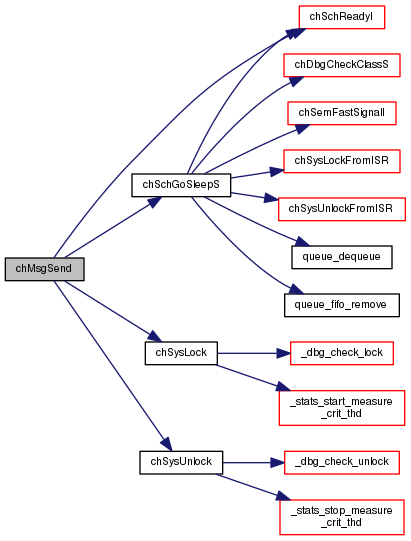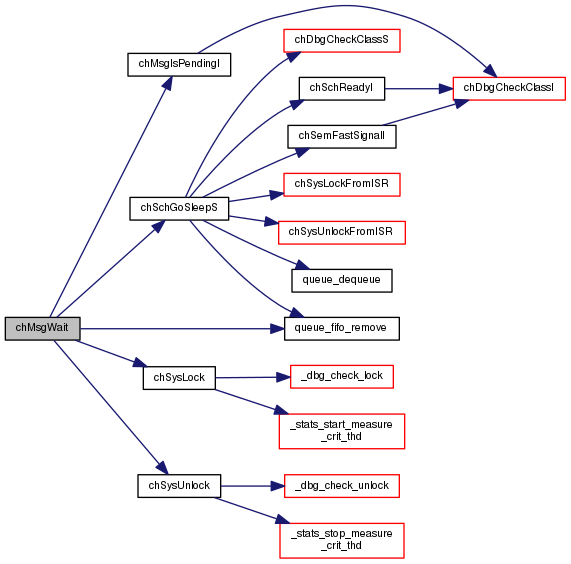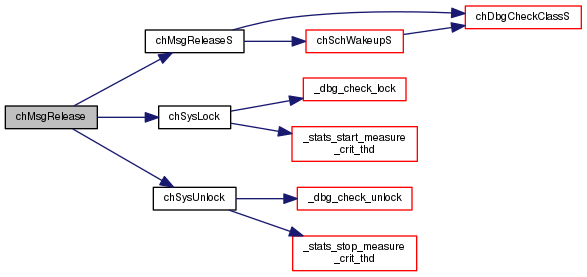
|
Detailed Description
Synchronous inter-thread messages APIs and services.
Operation Mode
Synchronous messages are an easy to use and fast IPC mechanism, threads can both act as message servers and/or message clients, the mechanism allows data to be carried in both directions. Note that messages are not copied between the client and server threads but just a pointer passed so the exchange is very time efficient.
Messages are scalar data types of type msg_t that are guaranteed to be size compatible with data pointers. Note that on some architectures function pointers can be larger that msg_t.
Messages are usually processed in FIFO order but it is possible to process them in priority order by enabling the CH_CFG_USE_MESSAGES_PRIORITY option in chconf.h.
- Precondition
- In order to use the message APIs the
CH_CFG_USE_MESSAGESoption must be enabled inchconf.h.
- Postcondition
- Enabling messages requires 6-12 (depending on the architecture) extra bytes in the
thread_tstructure.
Functions | |
| msg_t | chMsgSend (thread_t *tp, msg_t msg) |
| Sends a message to the specified thread. More... | |
| thread_t * | chMsgWait (void) |
| Suspends the thread and waits for an incoming message. More... | |
| void | chMsgRelease (thread_t *tp, msg_t msg) |
| Releases a sender thread specifying a response message. More... | |
| static bool | chMsgIsPendingI (thread_t *tp) |
Evaluates to true if the thread has pending messages. More... | |
| static msg_t | chMsgGet (thread_t *tp) |
| Returns the message carried by the specified thread. More... | |
| static void | chMsgReleaseS (thread_t *tp, msg_t msg) |
| Releases the thread waiting on top of the messages queue. More... | |
Function Documentation
| msg_t chMsgSend | ( | thread_t * | tp, |
| msg_t | msg | ||
| ) |
Sends a message to the specified thread.
The sender is stopped until the receiver executes a chMsgRelease()after receiving the message.
- Parameters
-
[in] tp the pointer to the thread [in] msg the message
- Returns
- The answer message from
chMsgRelease().
- Function Class:
- Normal API, this function can be invoked by regular system threads but not from within a lock zone.
Definition at line 87 of file chmsg.c.
References CH_STATE_SNDMSGQ, CH_STATE_WTMSG, chDbgCheck, chSchGoSleepS(), chSchReadyI(), chSysLock(), chSysUnlock(), currp, ch_thread::msgqueue, ch_thread::rdymsg, ch_thread::sentmsg, ch_thread::state, and ch_thread::u.

| thread_t * chMsgWait | ( | void | ) |
Suspends the thread and waits for an incoming message.
- Postcondition
- After receiving a message the function
chMsgGet()must be called in order to retrieve the message and thenchMsgRelease()must be invoked in order to acknowledge the reception and send the answer.
- Note
- If the message is a pointer then you can assume that the data pointed by the message is stable until you invoke
chMsgRelease()because the sending thread is suspended until then. - The reference counter of the sender thread is not increased, the returned pointer is a temporary reference.
- Returns
- A pointer to the thread carrying the message.
- Function Class:
- Normal API, this function can be invoked by regular system threads but not from within a lock zone.
Definition at line 121 of file chmsg.c.
References CH_STATE_SNDMSG, CH_STATE_WTMSG, chMsgIsPendingI(), chSchGoSleepS(), chSysLock(), chSysUnlock(), currp, queue_fifo_remove(), and ch_thread::state.

| void chMsgRelease | ( | thread_t * | tp, |
| msg_t | msg | ||
| ) |
Releases a sender thread specifying a response message.
- Precondition
- Invoke this function only after a message has been received using
chMsgWait().
- Parameters
-
[in] tp pointer to the thread [in] msg message to be returned to the sender
- Function Class:
- Normal API, this function can be invoked by regular system threads but not from within a lock zone.
Definition at line 145 of file chmsg.c.
References CH_STATE_SNDMSG, chDbgAssert, chMsgReleaseS(), chSysLock(), chSysUnlock(), and ch_thread::state.

|
inlinestatic |
Evaluates to true if the thread has pending messages.
- Parameters
-
[in] tp pointer to the thread
- Returns
- The pending messages status.
- Function Class:
- This is an I-Class API, this function can be invoked from within a system lock zone by both threads and interrupt handlers.
Definition at line 79 of file chmsg.h.
References chDbgCheckClassI(), ch_thread::msgqueue, and ch_threads_queue::next.
Referenced by chMsgWait().

|
inlinestatic |
Returns the message carried by the specified thread.
- Precondition
- This function must be invoked immediately after exiting a call to
chMsgWait().
- Parameters
-
[in] tp pointer to the thread
- Returns
- The message carried by the sender.
- Function Class:
- Normal API, this function can be invoked by regular system threads but not from within a lock zone.
Definition at line 96 of file chmsg.h.
References CH_STATE_SNDMSG, chDbgAssert, ch_thread::sentmsg, ch_thread::state, and ch_thread::u.
|
inlinestatic |
Releases the thread waiting on top of the messages queue.
- Precondition
- Invoke this function only after a message has been received using
chMsgWait().
- Parameters
-
[in] tp pointer to the thread [in] msg message to be returned to the sender
- Function Class:
- This is an S-Class API, this function can be invoked from within a system lock zone by threads only.
Definition at line 113 of file chmsg.h.
References chDbgCheckClassS(), and chSchWakeupS().
Referenced by chMsgRelease().

